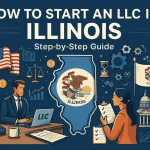When it comes to forming your LLC, you have two main options: tackle the paperwork yourself (the DIY route) or use a professional service (which could mean an online LLC formation company or hiring an attorney). Both approaches can get you to the same end result – a legally formed Limited Liability Company – but they each have advantages and disadvantages. The best choice depends on your priorities, budget, and comfort level with legal forms.
Let’s break down the pros and cons of each approach:
DIY LLC Formation – Pros and Cons
Doing it yourself means you personally handle all the steps of forming your LLC. This typically involves:
- Researching your state’s requirements (like filling out Articles of Organization, any necessary forms, fees, etc.).
- Filling out and filing the formation documents with the appropriate state agency (usually the Secretary of State).
- Arranging for a registered agent (which could be yourself or someone you designate).
- Creating an operating agreement on your own.
- Handling any follow-up tasks like obtaining an EIN from the IRS and any state or local licenses.
Pros of DIY:
- Cost Savings: The most obvious benefit is saving money. You’ll only pay the state filing fees and minimal costs for things like postage (if mailing forms) or maybe a notarization if required. You avoid paying a service fee to a formation company or lawyer. For a bootstrapping entrepreneur, every dollar counts, and the DIY route can be the cheapest way to form an LLC.
- Direct Control: You’re in full control of the process. You know exactly what’s being filed and when. Some people take comfort in handling their own paperwork because they can double-check every detail. There’s no middleman, so nothing gets lost in translation.
- Educational Experience: Going through the process yourself can be a great learning experience. You’ll become more familiar with how business filings work and the ongoing requirements for your LLC. This knowledge can be useful down the road so you’re not always in the dark about legal formalities.
- No Sales Pitches: When you file yourself, you won’t be presented with a bunch of add-ons or upsells (which many services will offer, such as extra services or subscriptions). You decide what you need without any pressure.
Cons of DIY:
- Time and Effort: Preparing the documents and researching the requirements takes time, especially if you’ve never done it before. Each state has its own forms and rules, and you must ensure you’re doing everything correctly. This is time you could be spending on other aspects of your business.
- Learning Curve: If you’re not familiar with legal forms, some of the terminology and procedures can be confusing. You might have to dig through state websites or guides to figure out what information to provide. Mistakes like misfiling or omitting required info can cause delays or rejections.
- Potential for Errors: Without experience, it’s easier to make errors. For example, you might fill something out incorrectly or forget a step (like forgetting to publish a notice in states that require it, or not realizing you needed a certain permit). An error could mean your formation is delayed or, worst case, your liability protection could be compromised if something was done improperly.
- No Expert Guidance: If you hit a confusing point or have a specific question (like “Should I elect a specific management structure on this form?”), you don’t have readily available support. You’d need to find answers yourself or pay separately for advice.
- Organization Required: You’ll be responsible for keeping track of all documents and deadlines (like when your annual report is due). There’s no service automatically reminding you.
DIY is quite feasible if you have a relatively simple business, a bit of patience, and are willing to follow instructions carefully. Many single-owner businesses choose this path successfully. However, it does require diligence.
(Tip: If you choose to go DIY, consider following a detailed resource or checklist to make sure you don’t miss anything. For instance, our comprehensive LLC Registration Process guide walks you through each step of forming an LLC, which can be a valuable reference to ensure you do everything correctly.)
Using a Professional Service – Pros and Cons
Using a professional service means you’re outsourcing the formation process to experts. This could be an online LLC formation service or hiring an attorney. Online services (like popular formation companies) tend to be more affordable and handle the paperwork efficiently, while hiring a business attorney offers personalized legal advice but at a higher cost. We’ll focus on the general pros/cons that apply to using any external help.
Pros of Using a Service:
- Saves Time and Hassle: The biggest benefit is convenience. You fill out a simple online questionnaire or give your info to the attorney, and they handle preparing and filing all the necessary documents. This frees you up to focus on other tasks (like developing your business idea or marketing) instead of wrestling with forms.
- Expertise and Accuracy: Professionals know the process inside out. An experienced formation service or lawyer is less likely to make mistakes on your filings. They’ll ensure the documents are filled out correctly, submitted to the right place, and that all state requirements are met. This reduces the risk of delays or rejections due to paperwork errors.
- Additional Services Included: Formation services often bundle helpful extras, such as providing a registered agent (often free for the first year), obtaining your EIN, or creating a basic operating agreement. This can simplify your startup checklist since those tasks get handled for you. A lawyer can customize documents to your needs and give legal advice tailored to your situation.
- Guidance and Support: Good services offer customer support if you have questions. They can clarify points of confusion (for example, explaining what a registered agent is or how to fill out certain sections). If you hire a lawyer, you can get legal advice along the way — such as which state to choose for formation if you’re considering options, or how to structure certain provisions in your operating agreement.
- Peace of Mind: There’s a certain relief in knowing a professional has reviewed everything. You’re less likely to lie awake thinking “Did I do that part right?” Many business owners are more confident moving forward knowing their LLC was set up correctly without any overlooked details.
Cons of Using a Service:
- Cost: The obvious downside is the extra cost. Online formation services charge anywhere from $50 up to a few hundred dollars for their packages (not including state fees). Lawyers can charge a few hundred to over a thousand dollars for an LLC formation, depending on complexity. This is money that, in the DIY route, you wouldn’t spend.
- Possible Upsells: Some online services might push add-ons that you may not need, which could bump up the cost if you’re not careful. It’s important to stick to what you truly need. With an attorney, they might suggest additional legal services (like drafting contracts or setting up a trademark) which, while potentially useful, are additional costs to consider.
- Timing (maybe): While services are generally fast, you are to some extent on their timeline. Most are pretty quick, but if you hire a busy attorney, it might take a little time to schedule and prepare everything. However, this is usually minor; many online services submit filings within a day or two of receiving your info.
- Lack of Personal Touch (for online services): If you go with a budget online service, you might not get personalized legal advice. They’ll form your LLC, but they won’t advise you on things like whether your chosen business structure is optimal for taxes or if your operating agreement has the best clauses for your situation (they typically use a standard template). They also won’t represent you if there’s any legal issue with the formation. If you need more tailored advice, an attorney is better, but then cost goes up.
Most people who use a professional service find that the pros outweigh the cons, especially for first-time business owners who want to “get it done right.” It often comes down to valuing your time and wanting reassurance that everything is correctly handled.
Which Should You Choose?
Ask yourself a few key questions:
- How tight is my budget? If every dollar is critical and you’re comfortable doing legwork, DIY is the cheapest route. If you have a bit of budget, using a service can save time and potentially prevent costly mistakes.
- How complex is my situation? If you’re a one-person business with a straightforward plan, DIY is very doable. If you have multiple partners, are unsure about some legal aspects, or have a unique situation (like doing business in multiple states), a professional’s guidance can be very valuable. For multi-member LLCs, at the very least, consider consulting a lawyer or using a service that provides a good operating agreement.
- Am I comfortable with paperwork and legal language? If you don’t mind reading instructions and filling forms and you’re detail-oriented, DIY might be fine. But if the thought of navigating legal forms makes you anxious, it could be worth the cost to have someone handle it and walk you through.
- How soon do I need this done? If you need your LLC formed urgently, an online service with expedited filing can often get it done faster than if you’re figuring it out as you go. On the other hand, if you’re not in a rush, you might be willing to take the time to learn and do it solo.
DIY is a good choice for entrepreneurs who are budget-conscious, enjoy learning the process, and have relatively simple needs. Just be prepared to do a bit of homework and double-check your work. Many people successfully form their LLCs this way each year.
Professional service is ideal for those who prefer convenience, want to ensure accuracy, or have more complex needs or simply don’t have the time to handle the filings. The extra cost can often be justified by the time saved and the peace of mind.
Some entrepreneurs actually combine approaches: they start off reading and learning (DIY research) to understand what’s involved, then decide to use a service to execute it, so they know exactly what they are paying for and can be sure it’s done to their expectations.
Conclusion:
There’s no universally right answer in the DIY vs service debate – it comes down to your personal situation. The good news is that either way, you can end up with a properly formed LLC. If you do it yourself, make use of resources like step-by-step guides and state-provided instructions to avoid mistakes. If you go with a professional service, choose a reputable one that fits your budget and needs (you can refer to our guide on choosing the best LLC formation service to help with that decision).
Ultimately, whether you invest more time or more money, the goal is to get your business legally established so you can move on to actually running your business. Consider what you have more of (time or money) and what will give you greater confidence. If forming your LLC correctly and quickly with minimal hassle is a priority, a service is likely worth it. If saving money and learning the ropes appeals to you, DIY is an empowering path.
Whichever route you choose, congratulations on taking this important step for your business! Once your LLC is formed — by your own hands or with a bit of help — you’ll be ready to enjoy the benefits of that LLC and focus on growing your venture.














